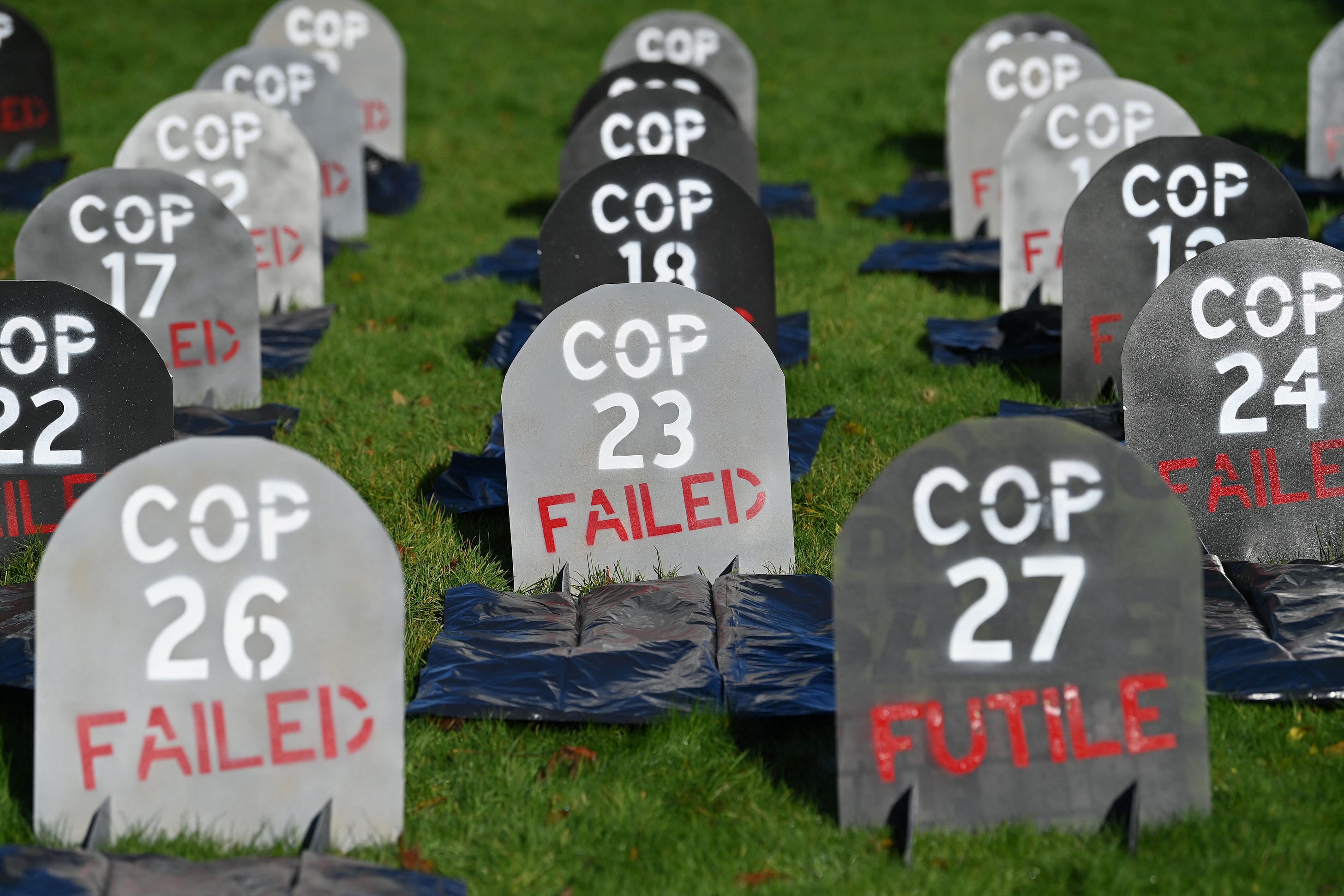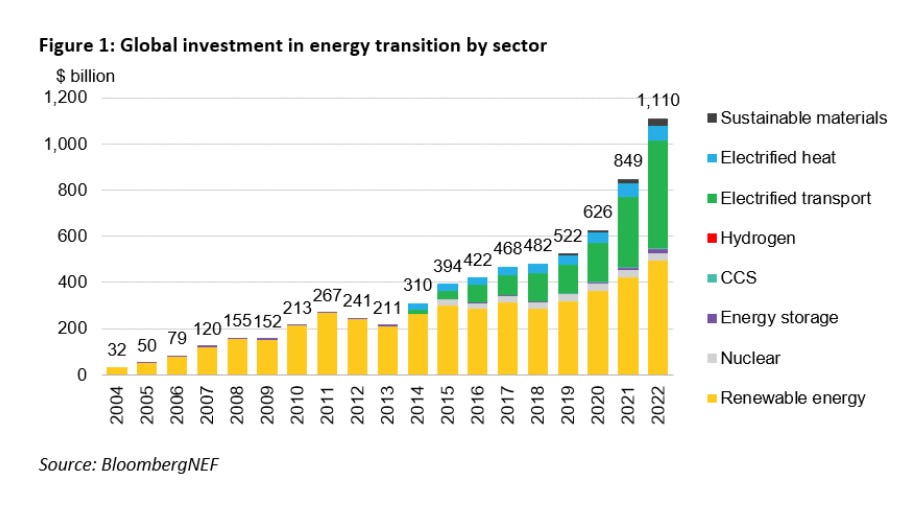The world promised to phase out fossil fuel subsidies. Instead, it doubled them.
Welcome back to HEATED, a newsletter for people who are pissed off about the climate crisis. In today’s edition we look at how the world is keeping fossil fuels on life support, at the expense of our future. The world promised to phase out fossil fuel subsidies. Instead, it doubled them.The sharp rise in fossil fuel subsidies is just one example of why activists say climate treaties are so often meaningless.In November 2021, 197 countries signed the Glasgow Climate Pact, a last-ditch attempt to land the world on a pathway to safe levels of global warming. The pact included a historic promise to stop pouring billions each year into financial aid for fossil fuels. It called on governments to accelerate the “phase-out of inefficient fossil fuel subsidies,” which keep the price of fossil fuels artificially low. The promise had the potential to make a real difference in the climate fight. “Fossil-fuel subsidies are one of the biggest financial barriers hampering the world’s shift to renewable energy sources,” Jocelyn Timperley wrote in the journal Nature in 2021. “Each year, governments around the world pour around half a trillion dollars into artificially lowering the price of fossil fuels — more than triple what renewables receive.” As such, many experts hailed the subsidy language as a milestone. Former Obama administration climate negotiator Jennifer Haverkamp called it “a reflection of the increased sense of urgency and public pressure on the parties to show that they are seriously addressing the problem.” The New Scientist called it “unprecedented,” noting that “fossil fuel subsidies have never been explicitly mentioned in 26 years of treaties and decisions at UN climate talks.” But a year and a half later, it’s become clear that this historic promise was meaningless. According to an International Energy Agency report released last week, global fossil fuel subsidies rose to $1.1 trillion in 2022–more than double the amount of fossil fuel subsidies in 2021. Global oil subsidies rose by 85 percent, while subsidies for natural gas more than doubled. It’s just the latest example of an international climate pledge failing to deliver. And it’s why many activists say it’s time to seriously revamp the process. Fixing the price of fossil fuelsThe sharp rise in fossil fuel subsidies last year was, to be fair, primarily due to emergency circumstances: The energy crisis caused by Russia’s invasion of Ukraine. As countries like the U.S. imposed increasingly strict economic sanctions on Russia for its invasion, Russia retaliated by shutting off its gas pipelines to Europe, inflating energy prices to new highs. To ensure consumers didn’t feel the full brunt of those prices, governments around the world sprang into emergency action, using tactics like keeping consumer fuel prices artificially low. The majority of these extra subsidies were paid by governments in developing economies, the IEA said. But advanced economies like the U.S. and Europe also increased their fossil fuel subsidies, spending a total of $500 billion in 2022 helping people with their energy bills. (The IEA didn’t consider these subsidies in their report because consumers in the U.S. and Europe still paid above market value for fossil fuel energy). These subsidies likely helped shield millions from the adverse impacts of the energy crisis. And this is precisely what governments are for: reacting quickly during emergencies to ensure people’s lives and livelihoods are not in danger. But even the IEA noted that this emergency reaction was only necessary because of the world’s poor response to another emergency: the climate crisis. If governments had been doing what they’d promised in earlier climate pacts—that is, transitioning to renewables while correcting artificially low fossil fuel pricing—the energy crisis wouldn’t have necessitated so much additional spending on fossil fuel subsidies. This is why the IEA says “It is far better for governments to spend time and money on structural changes that bring down fossil fuel demand, rather than on emergency relief when fuel prices go up.” Because fossil fuel subsidies may protect consumers in the short-term, but they have the long-term effect of exacerbating the climate crisis, which is only going to bring more pandemics, conflicts, supply chain issues, and future energy crises. The energy crisis was an emergency, but it wasn’t an outlier. It is merely a precursor of things to come if governments don’t deal with the climate crisis. As the world continues to warm, access to basic necessities like power and fuel will get harder and more expensive. The latest in a line of broken promisesThis isn’t the first time countries have failed to deliver on promises to stop artificially inflating the price of fossil fuels. The G20 pledged to phase out inefficient fossil fuel subsidies at the Pittsburgh Summit in 2009, and never followed through. The G7 also reaffirmed a commitment to do the same at the Ise-Shima Summit in 2016, and did not do it. Other climate promises also continue to be broken. Leading up to COP26, China said it would reduce emissions before 2030 and reach carbon neutrality by 2060. But in 2022, China committed to building more coal plants, a 50 percent increase over the year prior. The G20’s then-president and former Italian Prime Minister Mario Draghi pledged to phase out fossil fuels at COP26, but Europe looked to coal and natural gas from other countries to stockpile fuel reserves for winter. The U.S. under President Biden has made many climate promises. But in 2022, the U.S. profited by becoming the largest liquefied natural gas exporter in the world. This isn’t to say that no progress has been made. A global $1.1 trillion was invested in low-carbon energy in 2022. This marks the first time ever that investment in clean energy equaled investment in fossil fuels. That historic milestone was thanks, in part, to energy transition investment in China, the U.S. Inflation Reduction Act, and the European Union’s REPowerEU Plan. The energy crisis also accelerated investment in renewable energy to a new high. The IEA forecasts that renewables will account for 90% of global electricity capacity expansion by 2027, mainly driven by China, the EU, the U.S., and India. These milestones, however, are still not enough. Global investment in low-carbon technology has to immediately triple to reach a 2050 net-zero pathway, according to Bloomberg New Energy Finance. That would mean investing an annual average of $4.55 trillion for the remainder of this decade in order to get back on track. This is why some activists say a new process for global climate promises is needed. 30 years of climate inactionActivists and experts say that there is a fundamental problem with the way treaties like the Paris Agreement and Glasgow Climate Pact are set up. Countries have no incentives to comply, because there are no penalties for signing a climate accord but not following through. That’s led to 30 years of incremental progress where massive change is needed. There’s even scientific evidence that international treaties of all kinds just don’t work. A recent study from York University in the Proceedings of the National Academy of Sciences reported that international treaties without enforcement mechanisms aren’t effective. The authors found that only tools like financial sanctions or expulsion compelled signatories to follow through. That’s why environmental treaties need penalties for countries that don’t meet their climate goals, say experts like Larry Susskind, who runs the MIT Harvard Public Disputes Program. Trade restrictions between countries that have ratified a climate agreement, and those who haven’t, are another proposed solution. But the industries that cause climate change also have to get on board with real solutions. Consider the Montreal Protocol: the one, shining example of collective action actually solving a climate problem, the hole in the ozone layer. One of the factors that worked in the Montreal Protocol’s favor was American chemical giant DuPont, which threw its support behind the agreement because it was no longer making money off of the ozone-killing chemicals known as chlorofluorocarbons (CFCs). But the fossil fuel industry is still making money off their products—now more than ever before. This is why climate promises never come to pass. The polluters’ pocketbooks are government-lined. Further reading:
Catch of the Day: Besties Sully (left) and Gus are so happy to see you after hiking and playing in puddles! Sully is now a spirit doggo, but reader Kimberly says that he’s with them every time they go out. May we all have some puddles to play in, and a friend to watch over us. You're currently a free subscriber to HEATED. For the full experience, upgrade your subscription. |
Older messages
Do fossil fuels have a place in the net zero transition?
Thursday, February 23, 2023
In our first edition of Wormhole, Arielle dives into a question that kept coming up in our previous story.
This is what they call "essential for life"
Tuesday, February 21, 2023
The environmental disaster in East Palestine, Ohio has everything to do with our dependence on fossil fuels.
These natural gas ads are full of hot air
Friday, February 17, 2023
Gas companies say their clean energy claims are backed by science. They fail to mention the science is fossil fuel funded.
Meet the man fueling clean energy opposition in the Midwest
Thursday, February 9, 2023
Kevon Martis and a group of fossil fuel-funded allies have led a decades-long campaign to sow fear and misinformation about renewable energy. It's working.
UPDATE: Ed Markey probes AGU over fossil fuel funding
Friday, February 3, 2023
The Democratic Senator is now asking the same questions HEATED asked in our investigation last week—and more.
You Might Also Like
Meghan Markle Nailed The Easy Spring Outfit Of Our Dreams
Thursday, March 6, 2025
She met up with Serena Williams for a casual lunch date. The Zoe Report Daily The Zoe Report 3.5.2025 Meghan Markle Nailed The Easy Spring Outfit Of Our Dreams (Celebrity) Meghan Markle Nailed The Easy
What I Learned From a 30-Minute Recomp Workout
Wednesday, March 5, 2025
View in Browser Men's Health SHOP MVP EXCLUSIVES SUBSCRIBE What I Learned From a 30-Minute Recomp Workout What I Learned From a 30-Minute Recomp Workout Dr. Pat Davidson's 'Double-Deuce
What People Are Getting Wrong: Measles Myths
Wednesday, March 5, 2025
3 Roth IRA Rules to Know During Tax Season. It turns out that hosting "measles parties" is a bad idea. Not displaying correctly? View this newsletter online. TODAY'S FEATURED STORY What
‘My Friends Abandoned Me When They Had Kids’
Wednesday, March 5, 2025
Today in style, self, culture, and power. The Cut March 5, 2025 ADVICE 'My Friends Abandoned Me When They Had Kids' You need to pick one or two friendships and fight for them. The rest are
Sydney Sweeney Wore A Super Sparkly Dress With Cutouts After The Oscars
Wednesday, March 5, 2025
Plus, the hilarious Chelsea Handler, your daily horoscope, and more. Mar. 5, 2025 Bustle Daily Chelsea Handler shares four of her favorite books. Bustle ONE NIGHTSTAND Why Chelsea Handler Has No
The ultimate guide to instant noodles
Wednesday, March 5, 2025
Inside the closure of LA institution The Original Pantry Cafe
Save the Date for Poetry & the Creative Mind
Wednesday, March 5, 2025
Thursday, April 24, 2025 View this email in your browser Twitter Facebook Website Copyright © 2025 The Academy of American Poets, All rights reserved. You are receiving this email because you opted in
Is This The Best Serum For Dark Spots Yet?
Wednesday, March 5, 2025
According to Clinique, yes. Mar. 5, 2025 Bustle Daily Clinique's New Clinical Dark Spot Serum Is A New Era In Even Skin Presented by Clinique Clinique's New Clinical Dark Spot Serum Is A New
Win the ultimate bedroom makeover! Enter now!
Wednesday, March 5, 2025
The Sleep More Sweepstakes
Urbanism And Lent
Wednesday, March 5, 2025
Pleasurable things can also be constructive ͏ ͏ ͏ ͏ ͏ ͏ ͏ ͏ ͏ ͏ ͏ ͏ ͏ ͏ ͏ ͏ ͏ ͏ ͏ ͏ ͏ ͏ ͏ ͏ ͏ ͏ ͏ ͏ ͏ ͏ ͏ ͏ ͏ ͏ ͏ ͏ ͏ ͏ ͏ ͏ ͏ ͏ ͏ ͏ ͏ ͏ ͏ ͏ ͏ ͏ ͏ ͏ ͏ ͏ ͏ ͏ ͏ ͏ ͏ ͏ ͏ ͏ ͏ ͏ ͏ ͏ ͏ ͏ ͏ ͏ ͏ ͏ ͏ ͏ ͏ ͏ ͏ ͏ ͏




